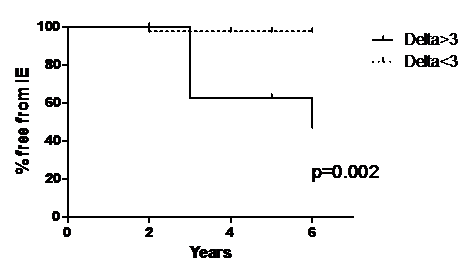Session Information
Title: Antiphospholipid Syndrome: Clinical Manifestations and New Biomarkers in Antiphospholipid Syndrome
Session Type: Abstract Submissions (ACR)
Prospective Validation of the Global Antiphospholipid Syndrome Score (GAPSS)
Background/Purpose: Backgrounds: This study was performed to prospectively and independently validate the GAPSS (1) (Global APS Score), a score system derived from the combination of independent risk factors for thrombosis, taking into account the antiphospholipid antibodies (aPL) profile and the conventional cardiovascular risk factors.
Methods:
GAPSS were prospectively applied to 52 consecutive SLE patients with positive aPL (51 female, mean age 39.1±10.6, mean follow-up 47.53±19.15 months). GAPSS scoring system was calculated yearly for each patient by adding together the points corresponding to the risk factors.
Results:
An increase of more than 3 points in GAPSS during the follow-up was strongly associated with higher risk of thrombosis (HR 25.00 [95%IC 3.74-189.1]). The risk of thrombosis was also evaluated by Kaplan-Meier analysis (fig.1; IE: ischemic event) and the cumulative proportion of thrombosis-free individuals was higher (p=0.002) in the patients whose GAPSS was not increased by 3 or more points.
Conclusion:
We have prospectively demonstrated that GAPSS is a valid tool for accurate prediction of thrombosis in SLE patients with aPL.
1. GAPSS: the Global Anti-Phospholipid Syndrome Score. Rheumatology (Oxford). 2013 Jan 12. [Epub ahead of print]
Disclosure:
S. Sciascia,
None;
M. J. Cuadrado,
None;
G. Sanna,
None;
V. Murru,
None;
D. Roccatello,
None;
O. Ateka,
None;
M. A. Khamashta,
None;
M. L. Bertolaccini,
None.
« Back to 2013 ACR/ARHP Annual Meeting
ACR Meeting Abstracts - https://acrabstracts.org/abstract/prospective-validation-of-the-global-antiphospholipid-syndrome-score-gapss/

